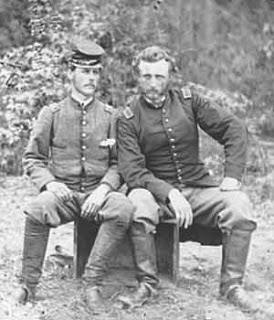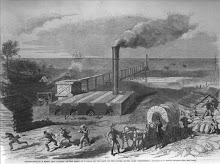-Emerald Yumang
Sunday, December 12, 2010
Pre-Civil War: A firsthand account of living in the city
My husband, our son and I left the rural country side and moved into the city last month. We had heard that there were great opportunities in the city and we were eager to be a part of them. However, this city life is not exactly what we expected. I have been working from dawn until dusk in the textile factory. Working conditions are rough, it is cramped, hot, and people are often hurt. My husband, son, and I all live in a one room apartment. The streets are extremely dirty, raw sewage and disease are always lingering. I hope these conditions improve soon, I don't know how long we can last.
-Leah Defigueiredo
http://lincoln.georgetowncollege.edu/eighth/Northern%20Factory%20Workers%20Placard%202.pdf
-Leah Defigueiredo
http://lincoln.georgetowncollege.edu/eighth/Northern%20Factory%20Workers%20Placard%202.pdf
Pre-Civil War: Manufacturing
Before the Civil War, factories were very prominent in the North.
-Emerald Yumang
http://teachinghistory.org/
-Emerald Yumang
http://teachinghistory.org/
Pre-Civil War: Effect of factory work on Social Life
The fast evolution of industry was causing an influx of people to cities. Men, women, and children left their rural lifestyles in pursuit of new opportunities as factory workers. Cities were not prepared for the high- levels of immigrants, which had deletarious effects on living conditions. Living areas, were overcrowded, causing poor sanitation,the spread of disease, cramped quarters, and high risk of fires. As more factories were built, more people traveled to cities to be a part of this industrial marvel.
-Leah Defigueiredo
http://lincoln.georgetowncollege.edu/eighth/Northern%20Factory%20Workers%20Placard%202.pdf
-Leah Defigueiredo
http://lincoln.georgetowncollege.edu/eighth/Northern%20Factory%20Workers%20Placard%202.pdf
Pre-Civil War: The Factory Act
The Factory Act was an act that tried to fix the bad working condition during the Industrial Revolution. Sufficient and respectable work hours would be established, including prohibiting working during the night and an established hour and a half long lunch. Unfortunately, though it helped, it was only for textile factories.
-Emerald Yumang
http://www.ebcwebstore.com/imageenlarge/suvidha_images/3666FACTORY-ACT%20%5B%5D.jpg
http://www.spartacus.schoolnet.co.uk/IR1833.htm
-Emerald Yumang
http://www.ebcwebstore.com/imageenlarge/suvidha_images/3666FACTORY-ACT%20%5B%5D.jpg
http://www.spartacus.schoolnet.co.uk/IR1833.htm
Pre-Civil War: Labor Unions for the Factory Workers
Before the Civil War, when factories were emerging because of the Industrial Revolution, many labor unions were formed in the North for the northern factory workers, because the conditions and lifestyles of the workers were not sanitary or sufficient.
-Emerald Yumang
http://legacy.lclark.edu/~soan221/96/fightwewin.JPG
http://www.helium.com/items/1121656-rise-of-labor-unions-industrial-revolution
Friday, December 10, 2010
Civil War: New Factories
During the Civil War, new factories emerged, sheltered by tariffs. Soaring prices because inflation forced factory workers to live a tight life, but overall manufacturers believed they were doing well.
-Emerald Yumang
http://t3.gstatic.com/images?q=tbn:ANd9GcR4v82g7aJAaQdYMQgcUfiCBRHjq0pv3agPtPfdO2fAm58N-jUB6Q
-Emerald Yumang
http://t3.gstatic.com/images?q=tbn:ANd9GcR4v82g7aJAaQdYMQgcUfiCBRHjq0pv3agPtPfdO2fAm58N-jUB6Q
Civil War: First Millionaire Class Emerges from Honest and Dishonest Factory Owners
Factories during the Civil War also brought the first millionaire class, some honest factory owners, others dishonest factory owners, some even doing thing such as putting cardboard soles in shoes and selling them.
-Emerald Yumang
http://www.iandrinstitute.org/Fist%20of%20Money.gif
-Emerald Yumang
http://www.iandrinstitute.org/Fist%20of%20Money.gif
Civil War: Factories
During the Civil War, the number of Northern factories was at least 5 times as more than in the South.
-Emerald Yumang
http://www2.lhric.org/pocantico/civilwar/charts6.jpg
-Emerald Yumang
http://www2.lhric.org/pocantico/civilwar/charts6.jpg
Civil War: A first hand account of women factory workers
I began working in the factory 4 months ago, when my husband left to fight the confederacy in the civil war. An increasing number of women and children are joining the factory. In the weapon factory, i feel like i am doing my part to help the war effort. We are producing mass amounts of weapons that are being sent to union soldiers on the daily. Since all the men are at war, women are stepping up to take the place of their husbands, brothers, and fathers in the factories.
-Leah Defigueiredo
Civil War: Political Effects of factory work
The south had all of its eggs in one basket with their cotton economy. The North had a great advantage in the war with its factories, and abundance of exports. The North used the South's weak economy as a weapon when they blockaded the south, preventing them from exporting their main crop, cotton. Factories were a major political factor in the civil war, and ultimately helped the North win the war.
-Leah Defigeiredo
http://www.civilwaracademy.com/civil-war-history.html
-Leah Defigeiredo
http://www.civilwaracademy.com/civil-war-history.html
Civil War:The rise of women in the factory
As men were sent to fight the civil war, women steppped in to the previously masculine role working in the factories. They produced many items including weapons, textiles, and other products.
-Leah Defigueiredo
Reconstruction: Northern Economy
The North had alot of rebuilding to do after the war, so they had to take steps to fix their nation. The North had to raise funds to rebuild areas that had been destroyed. To do so, they empoyed three different methods. First, they enacted protective tariffs, excise taxes on luxury goods, and an income tax. They also printed $450 in paper money. Union securities were marketed to investors both in the North and in Europe. Through these three methods, the North tried earn enough money to be restored.
-Leah Defigueiredo
Wednesday, December 8, 2010
Reconstruction: A first-hand account of a factory worker's life after war
I feel extremely fortunate that i kept my job in the textile factory. Our production is as high as ever and im glad that our economy is still strong. Some of the soldiers are beginning to come back from the war, and they are lifting the spirits of everyone in the city. There is some rebuilding that must be done in areas that were destroyed. However, overall i feel like this was a huge success for the North. I'm extremely glad the horrible institution of slavery has finally been brought down.
-Leah Defigueiredo
-Leah Defigueiredo
Sunday, December 5, 2010
Then and Now Connections: Labor Unions
Pre-Civil War, during the Industrial Revolution, unfair work hours and conditions were ignored by factory owners and the government. Long hours were normal, and sanitation was not worried about by factory owners. It was not until labor unions began to be formed and legal pursuits to get established work hours did fair conditions appear.
In today's society, labor unions are a big thing. There are exact established about of works hours, and also we have minimum wage, so that no company can cheat off a worker. Even the smallest unsatisfactory condition is blown out of proportion and even sometimes taken to court. Today's workplace is completely different from the work place of previous times.
-Emerald Yumang
In today's society, labor unions are a big thing. There are exact established about of works hours, and also we have minimum wage, so that no company can cheat off a worker. Even the smallest unsatisfactory condition is blown out of proportion and even sometimes taken to court. Today's workplace is completely different from the work place of previous times.
-Emerald Yumang
Analysis: The North after the Civil war
While the South Economy was completely destroyed after the civil war, the Northern factories were still a central part of their economy. The North did not face the same devestation the South did. Their economy was still completely intact. They continued to produce items in factories and export them to different countries. They used their exports as a tool to gain money to rebuild areas that had been destroyed.
-Leah Defigueiredo
http://www.cs.unm.edu/~sergiy/amhistory/ch22.html
-Leah Defigueiredo
http://www.cs.unm.edu/~sergiy/amhistory/ch22.html
Analysis: pre-civil war industry
Prior to the civil war, Industry was evolving and Northern factories were booming. The Industrial Revolution was in full swing, and with machines taking the place human work, products were being produced, quicker, and more effectively. People were becoming more involved in the economy, and northern citizens flocked to cities in search of new opportunities. New inventions including interchangeable parts, steamboats, and the cotton gin were making production increasingly easy.
-Emerald Yumang
http://www.sparknotes.com/history/american/precivilwar/section6.rhtml
-Emerald Yumang
http://www.sparknotes.com/history/american/precivilwar/section6.rhtml
Analysis: Factories vs. Plantations in the civil War
Factories vs. Plantations
The South had been extremely dependent on their cotton exports to keep their economy afloat. Cotton was a prosperous product, however, relying on one export was extremely disadvanteagous to the South. The North produced a variety of items in their factories. Their exports included textiles and weapons. The North was able to produce their own weapons during the war, which proved beneficial. Ultimately, the North's strong industry and factory proved victorious and helped them win the war. The South's planter aristocracy was not versatile enough to hold up Southern economy.
-Leah Defigueiredo http://edsitement.neh.gov/lesson-plan/factory-vs-plantation-north-and-south
Then and Now Connection: Women in Factories
From Pre-Civil War times to Reconstruction, women in factories was not often a sight to see. Although this changed a little during the Civil War, when women took over as men went off to war, women gaining equality to begin to work alongside men was still a big issue.
Today's day in age, women's role in society has changed dramatically. Women not only work in factories alongside men, but now they also have become prominent in society, becoming prominent money earners and extremely more independent then during the Civil war time periods.
-Emerald Yumang
Today's day in age, women's role in society has changed dramatically. Women not only work in factories alongside men, but now they also have become prominent in society, becoming prominent money earners and extremely more independent then during the Civil war time periods.
-Emerald Yumang
Subscribe to:
Comments (Atom)
















